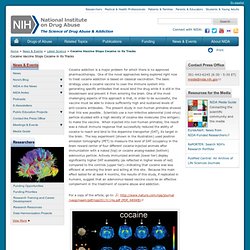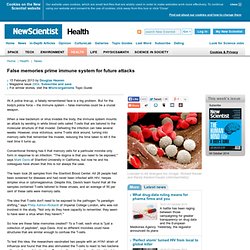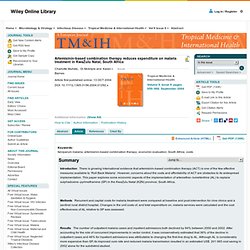

No Cookies. To use this website, cookies must be enabled in your browser.

To enable cookies, follow the instructions for your browser below. Facebook App: Open links in External Browser There is a specific issue with the Facebook in-app browser intermittently making requests to websites without cookies that had previously been set. Cocaine vaccine stops cocaine in its tracks. Skip to main content En español Home » News & Events » Latest Science » Cocaine Vaccine Stops Cocaine in its Tracks.

Designer bacteria may lead to better vaccines. Predict mutants to create universal flu vaccine. U.

MELBOURNE / MONASH U. (AUS) — Researchers have found a way to predict and potentially stop the mutating cells of the influenza virus. The finding may lead to a new universal influenza vaccine to better protect against both seasonal and pandemic outbreaks, says Katherine Kedzierska, the study’s senior author and an associate professor in the Department of Microbiology and Immunology at the University of Melbourne. Published in PNAS, the research will also help researchers understand T cell immunity against other viral infections such as HIV, Hepatitis C, and tumors. “The introduction of a new influenza strain into human circulation leads to a rapid global spread of the virus due to minimal antibody immunity,” says Kedzierska. “White blood cells called T cells are highly efficient in fighting influenza virus infection.
“However, influenza viruses can mutate their genes to escape efficient T cells. Source: University of Melbourne. False memories prime immune system for future attacks - health - 15 February 2013. IN A police line-up, a falsely remembered face is a big problem.

But for the body's police force – the immune system – false memories could be a crucial weapon. When a new bacterium or virus invades the body, the immune system mounts an attack by sending in white blood cells called T-cells that are tailored to the molecular structure of that invader. Defeating the infection can take several weeks. However, once victorious, some T-cells stick around, turning into memory cells that remember the invader, reducing the time taken to kill it the next time it turns up. Conventional thinking has it that memory cells for a particular microbe only form in response to an infection.
The team took 26 samples from the Stanford Blood Center. ‘Totally drug-resistant’ TB uncovered, outbreak would be untreatable. The world is facing outbreaks of “totally drug-resistant” tuberculosis if explosions of the bacteria in South Africa and other poorer nations are not addressed, according to a new papers published in Emerging Infectious Diseases.

At this point, researchers are working to determine how the bacteria gains its invincibility, and how to isolate it. Fears are mounting in medical communities worldwide that conventional treatments would be useless against the new disease, The Daily Mail‘s health site reports. Needleless Vaccinations a Huge Step Toward Eradicating Infectious Disease. In his first appearance on The Colbert Report last week, billionaire philanthropist Bill Gates made a bold prediction: “Polio was down to 250 cases last year in the entire world.

In the next six years we’ll get it down to zero and it’ll become the second disease to ever be eradicated.” Gates is putting his money where his mouth is by financing cutting-edge vaccination programs in the areas hardest hit by infectious disease. US scientists make tuberculosis breakthrough. Updated Fri 1 Feb 2013, 8:35pm AEDT Tuberculosis (TB) strikes more than 2 billion people across the planet, and US scientists have made a breakthrough they say could save hundreds of thousands of lives.

Effective drugs have been around for 50 years, but TB is far from eradicated. MMV390048. A recently discovered compound from the aminopyridine class not only has the potential to become part of a single-dose cure for all strains of malaria, but might also be able to block transmission of the parasite from person to person, according to a research collaboration involving the Medicines for Malaria Venture (MMV), based in Switzerland, and the Drug Discovery and Development Centre (H3-D) at the University of Cape Town, South Africa.

On the basis of initial results it was selected by MMV for further development - making it the first compound researched on African soil to enter preclinical development in partnership with MMV. An African solution to save lives. MMV390048 for Dummies. Compound cured animals infected with resistant malaria parasitesNew treatment should enter clinical trials in 2013Malaria killed 655,000 people in 2010 By Claire Bates Published: 14:35 GMT, 31 August 2012 | Updated: 17:22 GMT, 31 August 2012.

Artemether–lumefantrine (AL) Summary Introduction There is growing international evidence that artemisinin-based combination therapy (ACT) is one of the few effective measures available to ‘Roll Back Malaria’.

However, concerns about the costs and affordability of ACT are obstacles to its widespread implementation. This paper explores some economic aspects of the implementation of artemether–lumefantrine (AL) to replace sulphadoxine–pyrimethamine (SP) in the KwaZulu Natal (KZN) province, South Africa. Methods Recurrent and capital costs for malaria treatment were compared at baseline and post-intervention for nine clinics and a sentinel rural district hospital. Changes in the unit costs of, and total expenditure on, malaria services were calculated and the cost effectiveness of AL relative to SP was assessed.
Results The number of outpatient malaria cases and inpatient admissions both declined by 94% between 2000 and 2002. Introduction Figure 1. Download figure to PowerPoint Methods Malaria treatment costs Discussion. Artemether/lumefantrine Info. The combination artemether/lumefantrine (trade names Coartem and Riamet, Falcynate-LF) is a fixed-dose combination artemisinin-based combination therapy (ACT) indicated for the treatment of acute uncomplicated Plasmodium falciparum malaria. The individual drugs were both initially developed in China. Artemether is one of the semi-synthetic derivatives of artemisinin, and lumefantrine (also known as benflumetol and CGP 56695 during development) is purely synthetic.
The combination is an effective and well-tolerated malaria treatment, providing high cure rates even in areas of multi-drug resistance.[1][2][3] Side effects[edit] Effect of food and interactions[edit] Vaccines.